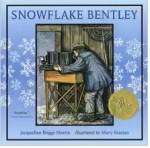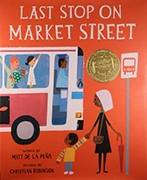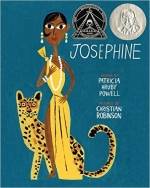January is awards season, and that goes for books, too. We’re on the cusp of hearing this year’s American Library Association (ALA)-sponsored awards. Most people recognize the Caldecott and Newbery medals, those have been going for nearly a century. But ALA has been steadily adding awards to recognize other areas of children’s publication, from the Batchelder for foreign publications, the Belpre award for Latin authors, the Geisel for beginning reader books, and the Robert F. Sibert Informational Book Medal.
 Robert F. Sibert was actually a bookbinder here in Illinois – Jacksonville, to be exact – whose company, Bound to Stay Bound, felt moved to honor his legacy by creating this award in his name. Shortly after he died in 1998, the yearly Caldecott Medal was given to a picture-book biography, Snowflake Bentley, coincidentally while another Champaign librarian, Janice Harrington, was on that awards committee. In 2001, the first Sibert medal was awarded to “the most distinguished children’s informational book” in all of America for the publishing year: think of it like the “Best Documentary” Oscar. But for kids. And in a book. While the exact eligibility requirements are many and varied, the only person in this town who needs to know and remember them all is a local librarian who gets to help choose who “the winner is…” this year.
Robert F. Sibert was actually a bookbinder here in Illinois – Jacksonville, to be exact – whose company, Bound to Stay Bound, felt moved to honor his legacy by creating this award in his name. Shortly after he died in 1998, the yearly Caldecott Medal was given to a picture-book biography, Snowflake Bentley, coincidentally while another Champaign librarian, Janice Harrington, was on that awards committee. In 2001, the first Sibert medal was awarded to “the most distinguished children’s informational book” in all of America for the publishing year: think of it like the “Best Documentary” Oscar. But for kids. And in a book. While the exact eligibility requirements are many and varied, the only person in this town who needs to know and remember them all is a local librarian who gets to help choose who “the winner is…” this year.
 Mike Rogalla, currently the interim Department Manager of Children’s Services at Champaign Public Library (CPL), is sitting on the 2017 Sibert committee, with the award to be announced just ten days from now on Monday, January 23rd. Throughout the year, nine members have been reviewing an ever-growing list of suggested non-fiction books in all formats that would appeal to any reader under the age of 14. It could be anything from a factual picture book, an illustrated biography, to a text-heavy chapter book, among any other format, as long as the content is informational. This year, Rogalla estimates he read over 400 eligible non-fiction titles that were suggested by committee peers or other ALSC (Association for Library Service to Children) members who filled out an online form.
Mike Rogalla, currently the interim Department Manager of Children’s Services at Champaign Public Library (CPL), is sitting on the 2017 Sibert committee, with the award to be announced just ten days from now on Monday, January 23rd. Throughout the year, nine members have been reviewing an ever-growing list of suggested non-fiction books in all formats that would appeal to any reader under the age of 14. It could be anything from a factual picture book, an illustrated biography, to a text-heavy chapter book, among any other format, as long as the content is informational. This year, Rogalla estimates he read over 400 eligible non-fiction titles that were suggested by committee peers or other ALSC (Association for Library Service to Children) members who filled out an online form.
It’s no coincidence that he’s spent nearly three decades as the non-fiction selector for CPL, but his area of expertise wasn’t necessarily the reason he was put on the election ballot to be voted onto the committee. Mike has spent years volunteering for ALA and ALSC, committing his free time to various committees and causes, from a joint committee working with publishers to even budgetary work. “At the end of the day, they just want people who get work done. That’s what it really involves: just a lot of work, a lot of organization even on an individual basis, just to keep this thing going.”
Mr. Rogalla spent enough time grinding, getting to know people and getting known for his efforts, so that in 2009-10 he spent a two-year term selecting books for the ALA Notables list. When he was asked to be on the ballot to be elected to the Caldecott Award committee, he missed it by just three votes. But with more hard work and exposure, his next run was highly successful, and he was the second most-highly voted librarian to be put onto the Sibert committee out of 4 voted, 4 appointed, and one chairperson.
 Beginning almost exactly a year ago, at the same conference where the 2016 awards were announced, the 2017 Sibert committee met for the first time, got organized, and got to watch last year’s announcements. It was there that Rogalla saw exactly what kind of impact his volunteer efforts could make. When Matt de la Peña was awarded the Newbery medal for Last Stop On Market St. (which also earned its illustrator a Caldecott honor), it was a very emotional moment for everyone. When Mike told me about the experience, color rushed to his face and his voice was trembling. “It strikes me how big a deal it is for [the authors] to be recognized like this, especially if the winner turns out to be somebody who never got it before, whether they’re a brand new author or one who’s been doing it for 50 years. […] It’s going to be permanent, it’s going to change their career – either going to validate it or launch it – depending on where they are already. Matt de la Peña last year, he said, ‘This is going to change everything. Finally, books with people who look like me.’”
Beginning almost exactly a year ago, at the same conference where the 2016 awards were announced, the 2017 Sibert committee met for the first time, got organized, and got to watch last year’s announcements. It was there that Rogalla saw exactly what kind of impact his volunteer efforts could make. When Matt de la Peña was awarded the Newbery medal for Last Stop On Market St. (which also earned its illustrator a Caldecott honor), it was a very emotional moment for everyone. When Mike told me about the experience, color rushed to his face and his voice was trembling. “It strikes me how big a deal it is for [the authors] to be recognized like this, especially if the winner turns out to be somebody who never got it before, whether they’re a brand new author or one who’s been doing it for 50 years. […] It’s going to be permanent, it’s going to change their career – either going to validate it or launch it – depending on where they are already. Matt de la Peña last year, he said, ‘This is going to change everything. Finally, books with people who look like me.’”
Although he began the year with that moment, there were a dozen months of hard work in between. Every book suggested by an ALSC member, through the online form or otherwise, was required to be looked at by the committee. Each month, the committee suggested titles to each other, carefully crafting pitches to appeal to the aspects they knew other members regarded highly. And the worst part: out of those 400 books he read, Mike is only allowed to nominate seven titles for final consideration. That’s less than 2% of well-reviewed, high-quality books published this year! The nominations went in chunks – 3 in October, 2 in November, and 2 in December – meaning he had the fewest spaces open when the highest number of books had been published. And those last two choices were the most agonizing for him; he told me that once he made his final selections, he verbally apologized to each one he didn’t pick as he returned it through the library’s conveyor belt book-drop.
With the final meeting just a week away, there’s still work to be done. There’s a final list of books that have been officially nominated (for those of you who are better at math than me, you know that 7 books multiplied by 9 committee members means a maximum of 63 titles, though Mike assures me it’s fewer thanks to overlapping nominations). Each committee member has 1/9 the final list to research, amass biographical data on the contributors, and write a summary in under 100 words. This information will become the basis for the citation should the book be chosen for the medal or an honor. Once they’re at the meeting, they have two 14-hour days in which to introduce, discuss, and vote on the title that will eventually get a shiny medallion noting it as the most noteworthy informational book of 2016. The final decision is made by 10 p.m. Saturday night, the publishers and contributors will be notified Sunday evening, and the awards will be given on Monday morning, January 23rd, at 7:30 a.m. Eastern time. “What I find really interesting,” said the librarian to me, “is that in almost a century, since 1922, never has any information about any of the awards leaked.”
 It’s a lot of hard work to put in the time and effort necessary to be considered for a committee like this, then once you make it, it’s even more hard work. Especially considering that the librarians themselves don’t get medals, and committee members’ names aren’t published anywhere outside the ALSC website, it can make one wonder what the appeal is. For Rogalla, he says, “I wanted to see if I could do it. But it’s also tremendous fun; you get to do what you don’t normally get to do on a daily basis – concentrate on literature. There are a lot of things you have to do to be part of a library and make things happen. When you get to focus on the literature, the thing that drew you to this job in the first place, that’s the rewarding part.”
It’s a lot of hard work to put in the time and effort necessary to be considered for a committee like this, then once you make it, it’s even more hard work. Especially considering that the librarians themselves don’t get medals, and committee members’ names aren’t published anywhere outside the ALSC website, it can make one wonder what the appeal is. For Rogalla, he says, “I wanted to see if I could do it. But it’s also tremendous fun; you get to do what you don’t normally get to do on a daily basis – concentrate on literature. There are a lot of things you have to do to be part of a library and make things happen. When you get to focus on the literature, the thing that drew you to this job in the first place, that’s the rewarding part.”
Of course, being on a committee like this, awarding a nationally-recognized medal, is also beneficial career-wise, “a solid addition to a resume”, he says. And both of his “media work” committee (ALA Notables and the Sibert Medal) resulted in him receiving free copies of books from the publishers that could be used to bolster the library’s collection. After three years on two committees, that’s netted nearly 2,000 children’s books. But it’s also a point of pride for our community, for Champaign-Urbana, to say that we have the country’s number one library school, and we employ librarians who are appointed to national awards committees. He and two other children’s librarians — Betsy Shea and Kristin Hungerford — are all serving on state-level awards committees for 2018, so next time you’re in the mood for a little light reading, you can be sure you’ll get a great recommendation.
About the writer…
Arts Editor rebecca knaur has read thousands of books and spent the last 20 selling, cataloging and recommending even more books. And yeah, she works at the same library, but that doesn’t make the news any less awesome, and only SP paid her for this article. Feel free to contact her on either her twitter or goodreads accounts.









 About the writer…
About the writer…